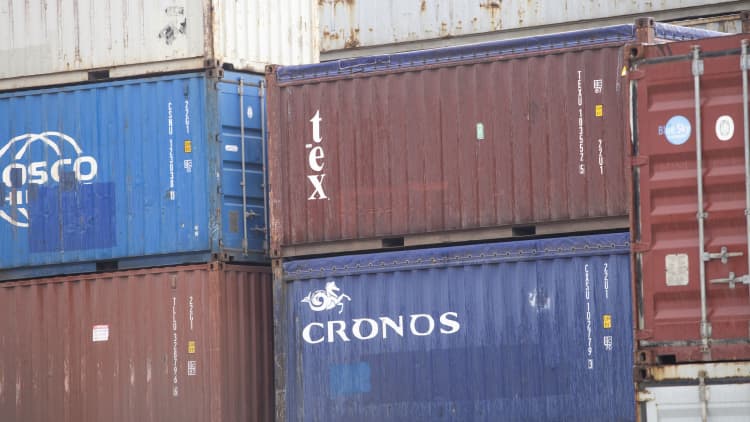
Foreign trade containers are being stacked at the container yard of Qingdao Port in Qingdao, China, on May 14, 2024.
Nurphoto | Nurphoto | Getty Images
China remains a “critical supplier” to the world and efforts for a full decoupling remain “difficult, if not impossible,” a trade report by Allianz Trade said.
Despite talk of decoupling and derisking from China, European companies remain bullish about prospects in the country — with nearly 40% of companies in Germany and Spain and more than 30% of firms in France expecting their supply chain footprint n the country to increase.
That’s according to the report which showed that only 27% of companies surveyed in the U.S. were planning to expand in China.
“European companies are clearly less worried than U.S. firms,” the report, led by Allianz Trade’s Head of Economic Research Ana Boata said.
The Allianz Trade survey polled more than 3,000 companies in China, France, Germany, Italy, Poland, Spain, the UK and the U.S. were surveyed about their outlook for global trade in 2024.
More than one-third of respondents plan to increase their China footprint, while only 11% said they would decrease it, the trade survey showed.
“China remains the world’s critical supplier, from which a full decoupling seems difficult, if not impossible,” the Allianz Trade report said.

Meanwhile in China, companies there are growing more optimistic about exporting to other countries.
Over one in ten exporters in China — the second-largest exporter of goods to the U.S. after Mexico —projected a greater than 10% increase in exports.
This is higher than other countries which mostly expected a 2% to 5% increase in exports, data from the report showed.
“Chinese exporters are more optimistic than [other countries] in the survey,” said Francoise Huang, senior economist for Asia Pacific at Allianz Trade.
“Last year was a bad year for overall exports, we had a global trade recession. So that’s why we think respondents in our survey are particularly optimistic,” Huang told CNBC’s “Squawk Box Asia” on Thursday.
Diversification is inevitable
Although companies might not completely decouple supply chains from China, diversification is still on the cards.
“Companies that are looking at diversifying their supply chains are looking at the rest of Asia Pacific, with a good focus on ASEAN,” Huang told CNBC, referring to the 10-member Southeast Asian trade bloc.
The report showed that exporters may be more optimistic in 2024 but have also become more concerned about the geopolitical landscape, as well as risks related to shortages of inputs and labor and financing.
About 73% of those surveyed said risks related to politics and protectionism were their top concern. Exporters are still worried about supply chain disruptions, with “31% of respondents placing transport risks among their top three risks and 28% included the risk of input shortages,” the report said.

About 48% of U.S. exporters that manufacture in China or have suppliers there say they would consider countries in Asia-Pacific and Latin America in their diversification efforts.
“Relocating within the same region and nearshoring seem to be the preferred trends,” the report said, adding that only 5% of respondents think reshoring trends will reverse in the next two years, while almost 30% expect it to increase.
The Russia-Ukraine war continues to be the largest geopolitical risk companies expect to hinder supply chains, while trade wars between the U.S. and China is the biggest threat to firms with long supply chains and more than 50% of foreign production.





